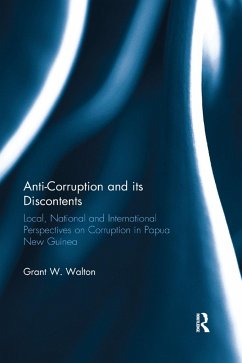The fight against corruption is now a core part of development policy and practice. Some call these efforts a 'war on corruption'. What does this so-called 'war' mean for developing countries? And how do international perspectives on corruption relate to local and national concerns? This book examines the relevance of anti-corruption discourse in Papua New Guinea (PNG), one of the most culturally rich and 'corrupt' countries on earth. Despite increased international, national and local efforts to address corruption over the past two decades, many fear that levels of corruption continue to rise largely unabated. Some believe that the mismatch between international, national and local assumptions regarding the nature of corruption and how it should be addressed is at the heart of the issue. International anti-corruption initiatives stress 'zero-tolerance' and try to strengthen formal state-based institutions. However, many people in PNG are more concerned about maintaining social relationships than following state laws and rules. This book critically examines the implications of the anti-corruption agenda and the collision of international, national and local perspectives. In doing so it provides a diagnostic on international assumptions about corruption and how it should be fought in developing countries, offering surprising and important lessons. This book is essential reading for scholars and students of Development Studies, Geography, Political Studies and Economics, as well as practitioners and policy makers working in development.
Hinweis: Dieser Artikel kann nur an eine deutsche Lieferadresse ausgeliefert werden.
Hinweis: Dieser Artikel kann nur an eine deutsche Lieferadresse ausgeliefert werden.

